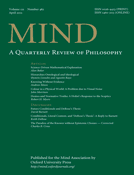
MIND
Scope & Guideline
Elevating Academic Dialogue Through Rigorous Scholarship
Introduction
Aims and Scopes
- Psychocardiology:
The journal extensively covers the field of psychocardiology, exploring how psychological factors, such as stress, anxiety, and depression, interact with cardiovascular diseases and affect patient outcomes. - Impact of Mental Health on Cardiovascular Disease:
Research frequently highlights the bidirectional relationship between mental health disorders and cardiovascular diseases, emphasizing the clinical implications of mental health on cardiovascular prognosis. - Integrative and Holistic Approaches:
The journal includes studies that investigate holistic and integrative approaches to treatment, such as the role of exercise, meditation, and traditional medicine, in managing both mental health and cardiovascular conditions. - Innovative Diagnostic Tools:
There is a strong emphasis on the use of advanced diagnostic tools, including artificial intelligence and machine learning, to improve the diagnosis and treatment of cardiovascular conditions, particularly in the context of mental health. - COVID-19 Related Research:
The impact of COVID-19 on cardiovascular health and mental well-being has become a significant focus, with numerous studies examining the long-term effects of the pandemic on both physical and psychological health.
Trending and Emerging
- Interdisciplinary Research:
There is a growing trend towards interdisciplinary research that combines cardiology, psychology, and public health, reflecting a holistic approach to understanding and treating health outcomes. - Mental Health Impact of COVID-19:
Research focusing on the psychological consequences of the COVID-19 pandemic, particularly its impact on cardiovascular diseases, is increasingly prominent, showcasing its relevance in current health discourse. - Artificial Intelligence in Healthcare:
The incorporation of artificial intelligence and machine learning in diagnosing and managing cardiovascular conditions is a rapidly emerging theme, highlighting the journal's commitment to innovative methodologies. - Holistic Treatment Approaches:
An increase in studies investigating the efficacy of holistic approaches, including exercise, meditation, and lifestyle changes, indicates a trend towards comprehensive care models that prioritize both mental and physical health. - Psychosocial Factors in Chronic Disease Management:
There is a rising emphasis on understanding psychosocial factors, such as stress, social support, and coping mechanisms, in the context of chronic cardiovascular diseases, reflecting a broader understanding of patient care.
Declining or Waning
- Traditional Cardiovascular Studies without Psychological Context:
There has been a noticeable decline in studies that focus solely on traditional cardiovascular parameters without considering psychological factors, reflecting a broader trend towards more integrated research. - Narrowly Defined Cardiovascular Interventions:
Research that solely investigates specific cardiovascular interventions without addressing the psychological implications or outcomes is becoming less frequent, indicating a shift towards a more comprehensive approach. - Single-Domain Mental Health Studies:
Papers that only examine isolated mental health issues, without linking them to cardiovascular outcomes or other physical health domains, are decreasing, as there is a growing recognition of the interconnectedness of physical and mental health.
Similar Journals
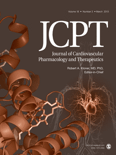
JOURNAL OF CARDIOVASCULAR PHARMACOLOGY AND THERAPEUTICS
Advancing cardiovascular care through innovative pharmacology.The JOURNAL OF CARDIOVASCULAR PHARMACOLOGY AND THERAPEUTICS, published by SAGE PUBLICATIONS INC, is a premier resource in the fields of cardiology and pharmacology, with an impressive impact factor reflective of its significant contributions to the scientific community. Established in 1996 and continuing through 2024, this journal is indexed in Scopus, achieving notable rankings, including Q2 in both Cardiology and Cardiovascular Medicine and Pharmacology. By fostering a multidisciplinary approach, it aims to improve pharmaceutical therapies and patient outcomes in cardiovascular health. Although not an open-access journal, it provides various subscription options to grant access to its cutting-edge research and reviews. As a vital platform for meaningful discourse and innovation in cardiovascular pharmacology, the journal attracts a diverse readership of researchers, professionals, and students, enhancing knowledge and advancing the field.
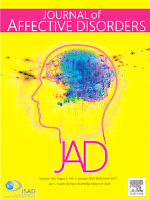
JOURNAL OF AFFECTIVE DISORDERS
Fostering breakthroughs in mental health studies.The Journal of Affective Disorders is a premier publication in the field of Clinical Psychology and Psychiatry and Mental Health, published by Elsevier. With an impressive impact factor and a consistent ranking in the Q1 category—12th in Clinical Psychology and 40th in Psychiatry and Mental Health—the journal serves as a critical platform for advancing research on affective disorders since its inception in 1979. The journal’s scope encompasses a wide range of topics related to mood disorders, providing researchers, professionals, and students with the latest findings, theoretical developments, and clinical insights. Despite being a non-open-access journal, subscribers benefit from comprehensive access to high-quality, peer-reviewed articles that inform clinical practice and enrich academic discourse. With its commitment to fostering scientific progress, The Journal of Affective Disorders remains instrumental in shaping the future of mental health research and practice.
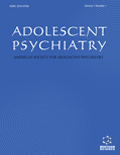
Adolescent Psychiatry
Enhancing understanding of adolescent psychological challenges.Adolescent Psychiatry, an esteemed publication by Bentham Science Publishers, focuses on the intricate and evolving field of adolescent mental health, covering a broad spectrum of topics relevant to both psychiatry and pediatrics. With its ISSN of 2210-6766 and E-ISSN of 2210-6774, this journal contributes significantly to its fields through rigorous research articles, clinical studies, and comprehensive reviews that enhance our understanding of adolescent psychological well-being. Operating out of the United Arab Emirates, this journal's impact is reflected in its Scopus rankings, placing it within the Q3 category of Pediatrics and Q4 in Psychiatry and Mental Health for 2023. Although not an open-access journal, it remains a vital resource for researchers, clinicians, and students seeking to advance their knowledge and practice regarding mental health issues in adolescents. With converged publication years from 2014 to 2015 and from 2019 to 2024, it continues to strive for excellence in publishing high-quality research that tackles contemporary challenges in adolescent psychiatry.
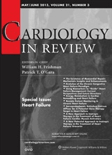
Cardiology in Review
Advancing cardiovascular knowledge for a healthier tomorrow.Cardiology in Review, published by Lippincott Williams & Wilkins, is a prominent journal focused on advancing the field of cardiology and cardiovascular medicine. With a history of publication spanning from 1995 to 2024, the journal serves as an essential resource for researchers, healthcare professionals, and students alike, offering in-depth reviews and analyses on the latest developments, clinical practices, and research findings in cardiology. Despite being a traditional print journal, it maintains a commendable Q2 ranking in both cardiology and miscellaneous medicine categories as of 2023, reflecting its influence and rigor in the academic community, with a Scopus rank of #132 out of 387 in its field, placing it in the 66th percentile. The journal aims to bridge the gap between clinical practice and emerging research, promoting a deeper understanding and integration of innovative strategies in cardiovascular care. With its commitment to high-quality scholarship, Cardiology in Review remains a vital conduit for knowledge and dialogue within the evolving landscape of cardiovascular health.

CURRENT CARDIOLOGY REVIEWS
Illuminating Contemporary Cardiovascular ChallengesCURRENT CARDIOLOGY REVIEWS, an esteemed journal published by BENTHAM SCIENCE PUBL LTD, is a pivotal resource in the field of cardiology and cardiovascular medicine. With an ISSN of 1573-403X and E-ISSN of 1875-6557, this journal presents comprehensive reviews that contribute significantly to the advancement of scientific knowledge and clinical practices in cardiology. Operating with open access options, CURRENT CARDIOLOGY REVIEWS is dedicated to bridging the gap between research and practice, thereby encouraging interdisciplinary collaboration and knowledge sharing. The journal has been instrumental in disseminating high-impact findings, consistently maintaining a Q2 category ranking in both Cardiology and Cardiovascular Medicine, as well as within the miscellaneous categories of Medicine, highlighting its relevance and respect in the academic community. Researchers, practitioners, and students alike will find valuable insights into contemporary cardiovascular issues, practices, and innovations that promote better patient outcomes. Based in the United Arab Emirates, CURRENT CARDIOLOGY REVIEWS encourages global contributions and reflects the latest advancements up to the year 2024, solidifying its role as an essential publication for those engaged in the quest for excellence in cardiovascular health.

Heart Views
Empowering heart health through open access research.Heart Views is a prestigious and influential journal dedicated to the field of cardiology and cardiovascular medicine, published by Wolters Kluwer Medknow Publications. With an Open Access model implemented since 2010, the journal ensures that its valuable research findings are accessible to a global audience, fostering knowledge dissemination and collaboration among researchers, professionals, and students alike. While the current impact factor is not specified, its commitment to quality and peer-reviewed content has established it as a significant resource within the cardiology community. The journal publishes a diverse array of articles, including original research, reviews, and clinical studies aimed at advancing the understanding and treatment of cardiovascular diseases. Heart Views serves as an essential platform for sharing innovative ideas and practices, thereby contributing to improved patient care and outcomes in the dynamic field of heart health.
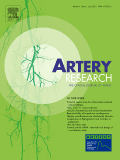
Artery Research
Exploring the frontiers of arterial health and pathology.Artery Research is an esteemed open access journal published by BMC in the United Kingdom, dedicated to advancing the field of vascular biology and cardiovascular medicine. Since its inception in 2006 and transitioning to an open access format in 2019, the journal has become a pivotal platform for disseminating high-quality research on arterial health, pathology, and the latest clinical advancements. With an impactful focus on anatomy, cardiology, and physiology, Artery Research holds a notable reputation within the global research community, ranked in the Q3 and Q4 category quartiles in its respective fields and reflected in its Scopus ranks. The journal aims to foster collaborations and discussions among researchers and practitioners by providing an accessible avenue for publishing pivotal findings and insights. As it continues to evolve through 2024 and beyond, Artery Research remains committed to enriching cardiovascular research and driving innovations toward better health outcomes.

REVISTA ESPANOLA DE CARDIOLOGIA
Elevating Cardiac Science, One Article at a TimeREVISTA ESPANOLA DE CARDIOLOGIA is a premier journal dedicated to the dynamic field of cardiology, published by EDICIONES DOYMA S A in Barcelona, Spain. With an impressive Q1 status in the Medicine (miscellaneous) category for 2023, this journal is recognized for its significant contributions to cardiovascular research, evidenced by its rank of #61 out of 387 in the Scopus database, placing it within the top 16% of journals in its field. Covering a broad range of topics within cardiology, the journal aims to disseminate high-quality research, clinical studies, and educational content, fostering knowledge sharing among researchers, clinicians, and students alike. While it does not currently offer open access, the journal maintains a commitment to advancing cardiovascular health through rigorous peer-reviewed articles. With a publication history that spans from 2013 to 2024, REVISTA ESPANOLA DE CARDIOLOGIA is an essential resource for those seeking to stay at the forefront of cardiology advancements and practices.
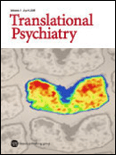
Translational Psychiatry
Fostering collaboration for a brighter future in mental health.Translational Psychiatry, an esteemed journal published by SpringerNature, is at the forefront of research in the fields of biological psychiatry, neuroscience, and mental health. With an impressive Q1 category ranking in Biological Psychiatry, Cellular and Molecular Neuroscience, and Psychiatry and Mental Health, the journal fosters high-quality scholarly work that informs clinical practices and guides future research directions. Since its inception in 2011, Translational Psychiatry has embraced the Open Access model, ensuring that groundbreaking findings are easily accessible to all, promoting collaboration and innovation within the global scientific community. With a solid ranking in Scopus—particularly at #33 out of 567 in Psychiatry and Mental Health and #6 out of 51 in Biological Psychiatry—this journal plays a critical role in advancing our understanding of mental health disorders, bridging the gap between bench science and clinical application. As it continues evolving through its converged years from 2011 to 2024, Translational Psychiatry remains an essential resource for researchers, healthcare professionals, and students dedicated to improving mental health outcomes.

Minerva Psychiatry
Elevating the Standards of Mental Health PracticesMinerva Psychiatry is an innovative open-access journal published by EDIZIONI MINERVA MEDICA, focusing on the field of psychiatry and mental health. Launched in 2021, the journal aims to advance understanding and research in this critical area of medicine, serving as a platform for the dissemination of original research, clinical trials, and reviews that contribute to the improvement of mental health practices globally. With an ISSN of 2724-6612 and E-ISSN 2724-6108, this journal is situated in Italy and addresses a wide array of topics relevant to both practitioners and researchers in psychiatry. While the journal is currently ranked Q4 in its category, it seeks to enhance its impact by fostering high-quality submissions that address contemporary issues in mental health. Interested authors and readers can explore its publications through open access, encouraging a collective effort to elevate the standards and accessibility of psychiatric knowledge. With its commitment to nurturing a robust dialogue in the field, Minerva Psychiatry is positioned to become a valuable resource for those dedicated to mental health research and practice.